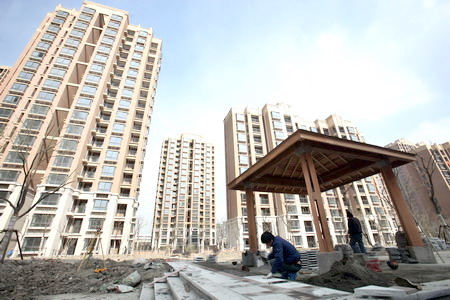-
News >Bizchina
Tax speculation drives housing sales
2011-01-18 10:32
Workers landscape the area surrounding a residential apartment complex in Shanghai. Recent media reports regarding a potential property tax have sparked a flurry of apartment purchases amid anticipation of tightening government policies to cool the housing market. [Photo / China Daily]
SHANGHAI - With media reports rife about a property tax soon to be launched in Shanghai, 30-year-old Zhou Xin had no hesitation in signing the purchasing contract for a two-bedroom apartment located in the Zhabei district of the city.Zhou had been looking for such an apartment for several months and the much-discussed property tax prompted him to buy before the Chinese Lunar New Year. The 2.8 million yuan ($0.42 million) apartment was already well decorated, so he moved in immediately.
On the other side of the Huangpu River, Xu Ying paid 21.5 million yuan for a 327-square-meter apartment located in a high-end property community in Pudong New Area in early January.
The 50-year-old said he made the decision quickly for of a number of reasons, such as the rising inflation rate, and the muted launch of the property tax.
"Our sales rose 40 percent during December month-on-month, fueled by news of a possible property tax," said Zhu Pingping, an analyst from Shanghai Sinyi Realty Agency and Consulting Co Ltd.
Trading volumes for first-hand residential properties in the city surged 51 percent in December compared with a month earlier, according to figures from Shanghai Centaline Property Agency Ltd. In addition, more than 38.5 percent of the residential units were traded in the secondary market in December month-on-month, with the average price of a pre-owned apartment reaching 23,325 yuan for each sq m, a rise of 7.6 percent.
"Demand was restrained in 2010, because the market was expecting property prices to slip under the central government's tightening policies. However, nothing happened, apart from a decrease in trading volumes and even a mild rise in housing prices. The threat of a property tax has catalyzed homebuyers' enthusiasm," said Zhu.
"Medium- to large-sized properties are more attractive," said Luo Yingshen, an analyst from Century 21 China Real Estate, a US-invested Chinese property agency.
According to Luo, secondary apartments sized between 90 sq m and 140 sq m (of gross floor area) are the most traded, with a transaction-volume increase of 62.81 percent in December compared with November, since properties within this size range are the most likely to be hit by a property tax.
Meanwhile, sales for apartment units bigger than 140 sq m surged 41.79 percent, while those for apartments smaller than 90 sq m rose 38.09 percent during the same period.
"It is unrealistic to expect a property tax to cure the property fever. But it will certainly raise the degree of risk for those holding several properties," said Zhang Liangjun, managing director of China operations with Cushman & Wakefield, a privately held commercial real estate service firm.
"The property tax, along with newly completed government-subsidized properties, will assuage the housing rush in the city this year, but I cannot see a fundamental shift happening soon," added Zhang.
"The property tax will increase the holding cost of properties and help to curb overly aggressive speculation on the market," said James Macdonald, senior manager at Savills research department in China.
In the long term, the tax will help change and stabilize the land and property markets and make more efficient use of existing supply as well as generating a more efficient allocation of capital, he added.
